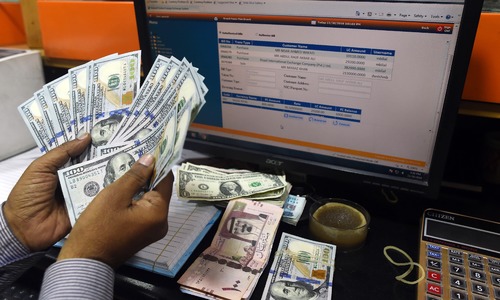THERE is no reason to panic following the sharp bout of volatility that swept financial markets on Friday, but there are strong grounds for concern.
The rupee saw the largest single-day plunge it has experienced in almost a decade, and even though by the close of trade it had regained some of the ground lost, the simple fact that such volatility occurred is a strong indicator that the economy is burdened with growing pressures that need to be dissipated urgently before they develop into a full-blown financial crisis.
Markets were not helped by Finance Minister Asad Umar’s announcement the day before that his government was in “no rush” to approach the IMF for a bailout in the face of the country’s rapidly dwindling reserves.
And his news conference in the middle of one of the most volatile days for the exchange rate did little to address those concerns. In his remarks, he pointed out that indicators in the external sector — remittances, foreign investment and exports — all showed a gradual return to health and the current account deficit was shrinking.
He also underlined his government’s efforts to stabilise the economy in the medium term, and used the occasion to announce a reduction of Rs2 in the price of petrol and diesel.
Absent from his remarks was any clear sense of how the reserves are to be strengthened in the short term, which is a question of overriding urgency at the moment. If the government is in no hurry to approach the IMF, the market wants to know whether it is in any rush to arrange an alternative supply of dollars. Thus far, all that has been on display is immense indecision, with talk of a Fund programme today, followed by disparaging remarks for those asking for a Fund programme tomorrow.
The mixed signals and the inability of the government to decide firmly on a road forward are at the heart of the problem.
The day ended on a note of extreme caution from the State Bank of Pakistan, that poured cold water on the finance minister’s words by sharply hiking interest rates by 150 basis points, the single largest hike since the cycle of monetary tightening began.
Such a step would not have been necessary if the economy had genuinely turned the corner, as Mr Umar had asserted only hours earlier. In its monetary policy statement, the central bank spoke of “rising inflation, an elevated fiscal deficit and low foreign exchange reserves” as the “near-term challenges” facing the economy.
With borrowing from the State Bank sharply on the rise, and a near-historic jump in the first-quarter fiscal deficit, the government may be facing a potential blowout if a sharp adjustment is not undertaken rapidly, regardless of the improvement in the external-sector indicators. The time to act has unambiguously arrived, yet we still await an action plan.
Published in Dawn, December 1st, 2018












































